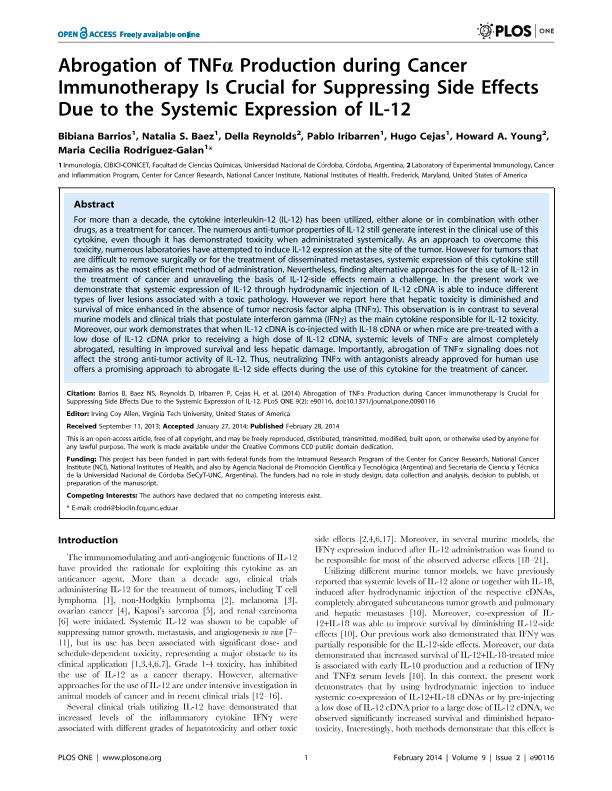Mostrar el registro sencillo del ítem
dc.contributor.author
Barrios, Bibiana Elisabet

dc.contributor.author
Baez, Natalia Soledad

dc.contributor.author
Reynolds, Della
dc.contributor.author
Iribarren, Pablo

dc.contributor.author
Cejas, Hugo
dc.contributor.author
Young, Howard A.
dc.contributor.author
Rodriguez Galan, Maria Cecilia

dc.date.available
2018-01-02T14:13:39Z
dc.date.issued
2014-02
dc.identifier.citation
Rodriguez Galan, Maria Cecilia; Young, Howard A.; Cejas, Hugo; Iribarren, Pablo; Reynolds, Della; Baez, Natalia Soledad; et al.; Abrogation of TNFα Production during Cancer Immunotherapy Is Crucial for Suppressing Side Effects Due to the Systemic Expression of IL-12; Public Library of Science; Plos One; 9; 2; 2-2014; 1-11
dc.identifier.issn
1932-6203
dc.identifier.uri
http://hdl.handle.net/11336/31955
dc.description.abstract
For more than a decade, the cytokine interleukin-12 (IL-12) has been utilized, either alone or in combination with otherdrugs, as a treatment for cancer. The numerous anti-tumor properties of IL-12 still generate interest in the clinical use of thiscytokine, even though it has demonstrated toxicity when administrated systemically. As an approach to overcome thistoxicity, numerous laboratories have attempted to induce IL-12 expression at the site of the tumor. However for tumors thatare difficult to remove surgically or for the treatment of disseminated metastases, systemic expression of this cytokine stillremains as the most efficient method of administration. Nevertheless, finding alternative approaches for the use of IL-12 inthe treatment of cancer and unraveling the basis of IL-12-side effects remain a challenge. In the present work wedemonstrate that systemic expression of IL-12 through hydrodynamic injection of IL-12 cDNA is able to induce differenttypes of liver lesions associated with a toxic pathology. However we report here that hepatic toxicity is diminished andsurvival of mice enhanced in the absence of tumor necrosis factor alpha (TNFa). This observation is in contrast to severalmurine models and clinical trials that postulate interferon gamma (IFNc) as the main cytokine responsible for IL-12 toxicity.Moreover, our work demonstrates that when IL-12 cDNA is co-injected with IL-18 cDNA or when mice are pre-treated with alow dose of IL-12 cDNA prior to receiving a high dose of IL-12 cDNA, systemic levels of TNFaare almost completelyabrogated, resulting in improved survival and less hepatic damage. Importantly, abrogation of TNFasignaling does notaffect the strong anti-tumor activity of IL-12. Thus, neutralizing TNFawith antagonists already approved for human useoffers a promising approach to abrogate IL-12 side effects during the use of this cytokine for the treatment of cancer.
dc.format
application/pdf
dc.language.iso
eng
dc.publisher
Public Library of Science

dc.rights
info:eu-repo/semantics/openAccess
dc.rights.uri
https://creativecommons.org/licenses/by-nc-sa/2.5/ar/
dc.subject
Il-12
dc.subject
Il-18
dc.subject
Tnf-A
dc.subject
Gene Therapy
dc.subject
Cancer
dc.subject.classification
Inmunología

dc.subject.classification
Medicina Básica

dc.subject.classification
CIENCIAS MÉDICAS Y DE LA SALUD

dc.title
Abrogation of TNFα Production during Cancer Immunotherapy Is Crucial for Suppressing Side Effects Due to the Systemic Expression of IL-12
dc.type
info:eu-repo/semantics/article
dc.type
info:ar-repo/semantics/artículo
dc.type
info:eu-repo/semantics/publishedVersion
dc.date.updated
2017-12-28T17:47:52Z
dc.journal.volume
9
dc.journal.number
2
dc.journal.pagination
1-11
dc.journal.pais
Estados Unidos

dc.journal.ciudad
San Francisco
dc.description.fil
Fil: Barrios, Bibiana Elisabet. Consejo Nacional de Investigaciones Científicas y Técnicas. Centro Científico Tecnológico Córdoba. Centro de Investigaciones en Bioquímica Clínica e Inmunología; Argentina
dc.description.fil
Fil: Baez, Natalia Soledad. Consejo Nacional de Investigaciones Científicas y Técnicas. Centro Científico Tecnológico Córdoba. Centro de Investigaciones en Bioquímica Clínica e Inmunología; Argentina
dc.description.fil
Fil: Reynolds, Della. National Cancer Institute. Maryland; Estados Unidos
dc.description.fil
Fil: Iribarren, Pablo. Consejo Nacional de Investigaciones Científicas y Técnicas. Centro Científico Tecnológico Córdoba. Centro de Investigaciones en Bioquímica Clínica e Inmunología; Argentina
dc.description.fil
Fil: Cejas, Hugo. Consejo Nacional de Investigaciones Científicas y Técnicas. Centro Científico Tecnológico Córdoba. Centro de Investigaciones en Bioquímica Clínica e Inmunología; Argentina
dc.description.fil
Fil: Young, Howard A.. National Cancer Institute. Maryland; Estados Unidos
dc.description.fil
Fil: Rodriguez Galan, Maria Cecilia. Consejo Nacional de Investigaciones Científicas y Técnicas. Centro Científico Tecnológico Córdoba. Centro de Investigaciones en Bioquímica Clínica e Inmunología; Argentina
dc.journal.title
Plos One

dc.relation.alternativeid
info:eu-repo/semantics/altIdentifier/doi/http://dx.doi.org/10.1371/journal.pone.0090116
dc.relation.alternativeid
info:eu-repo/semantics/altIdentifier/url/http://journals.plos.org/plosone/article?id=10.1371/journal.pone.0090116
Archivos asociados
